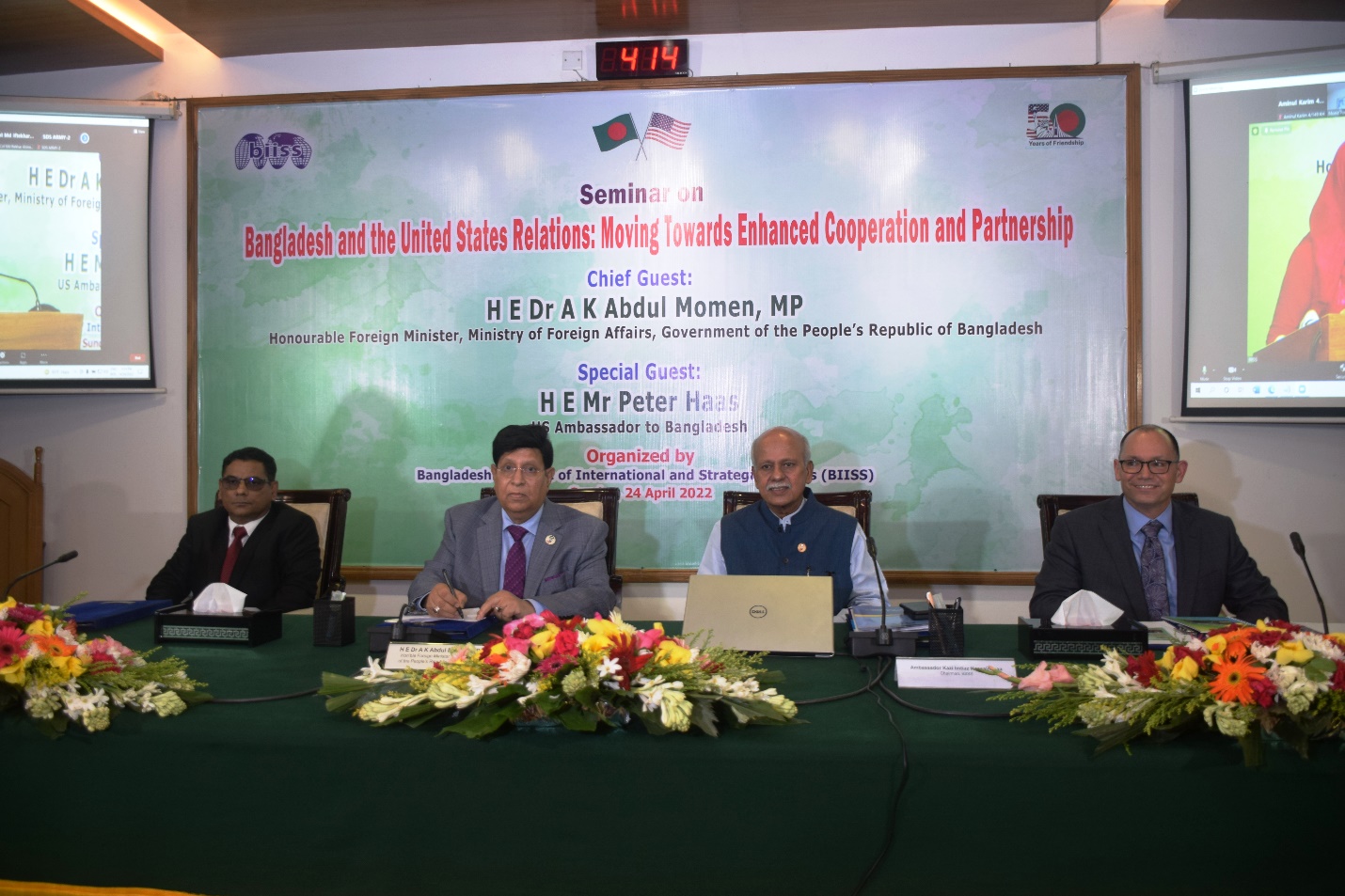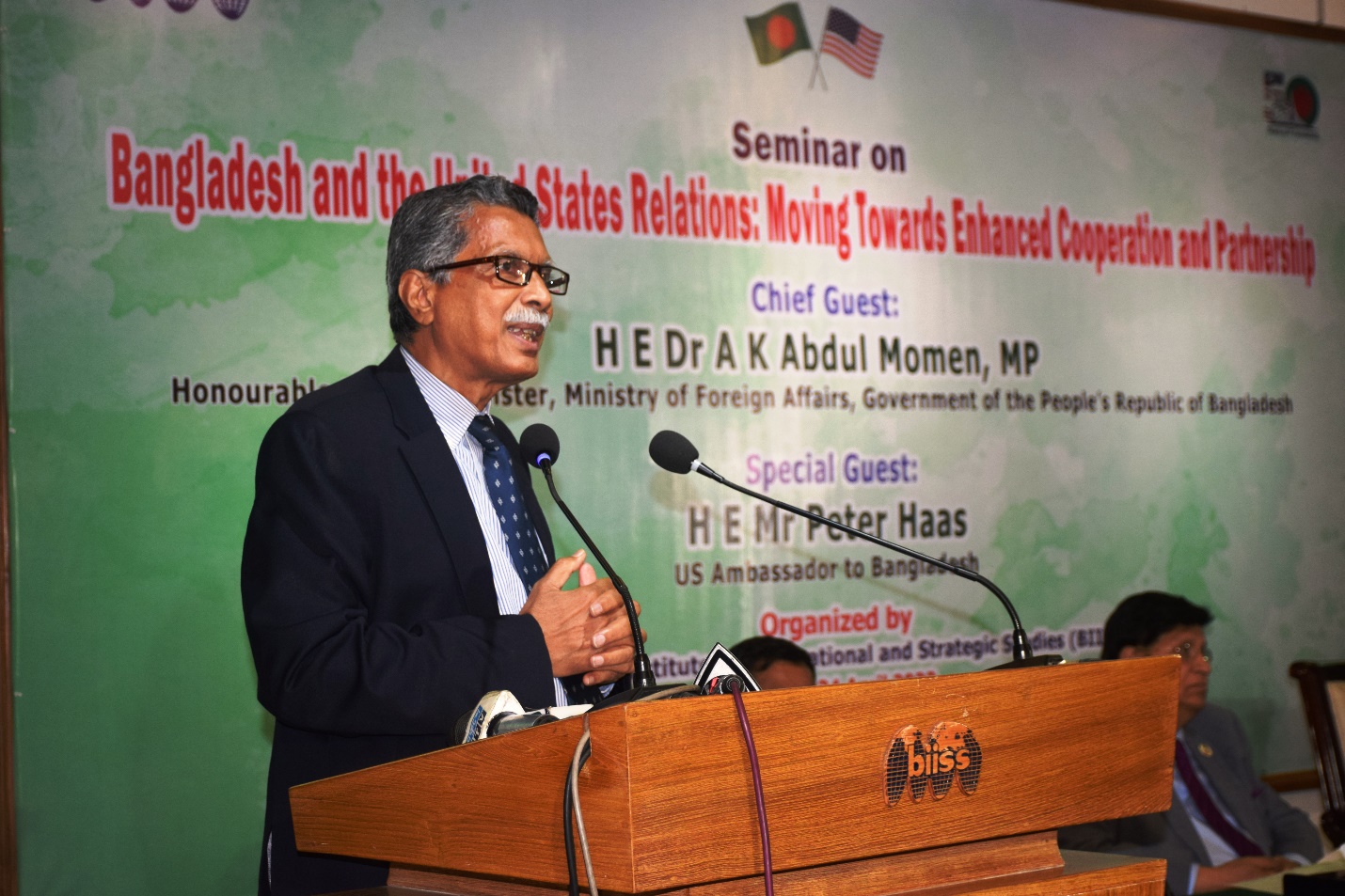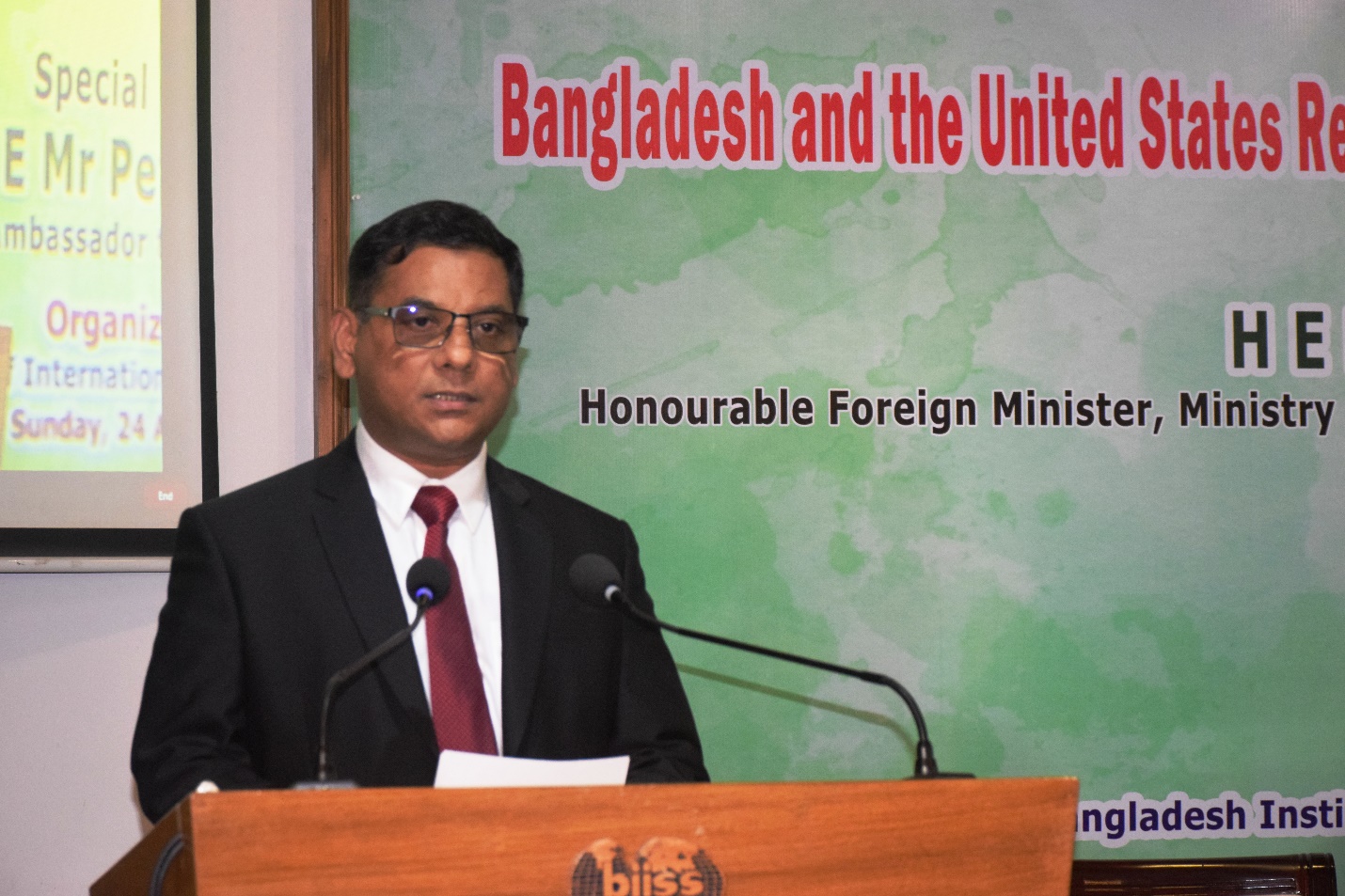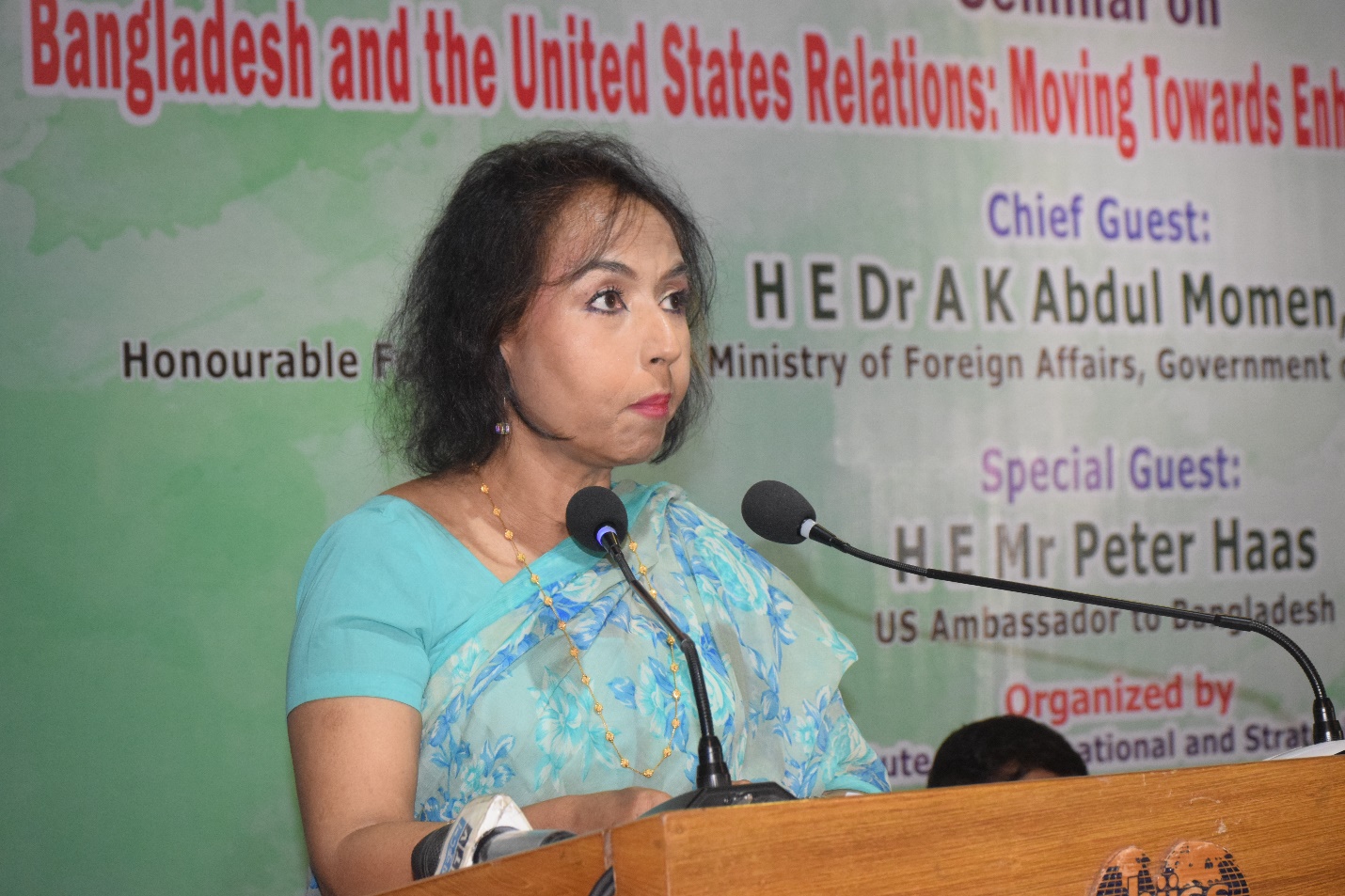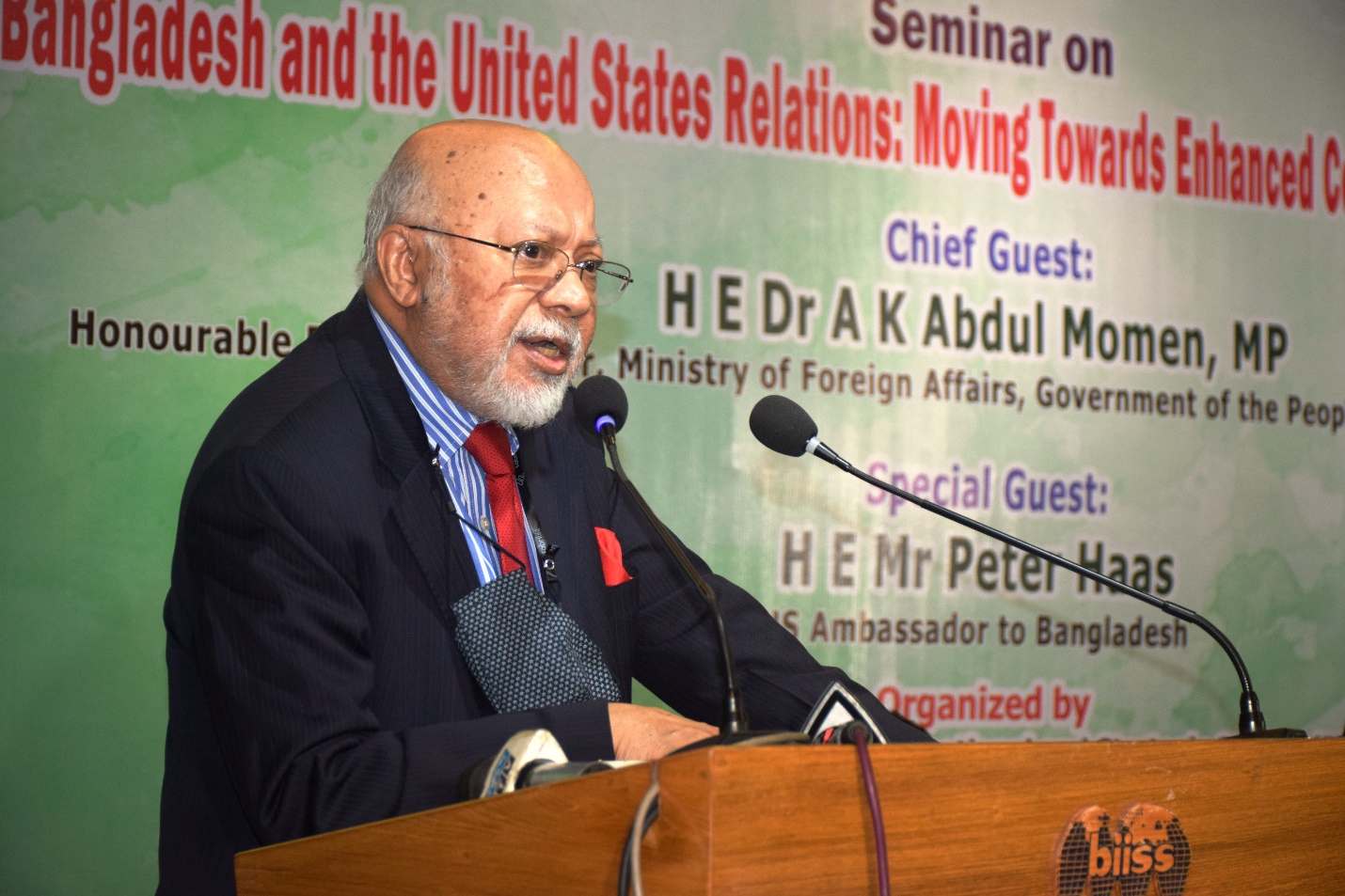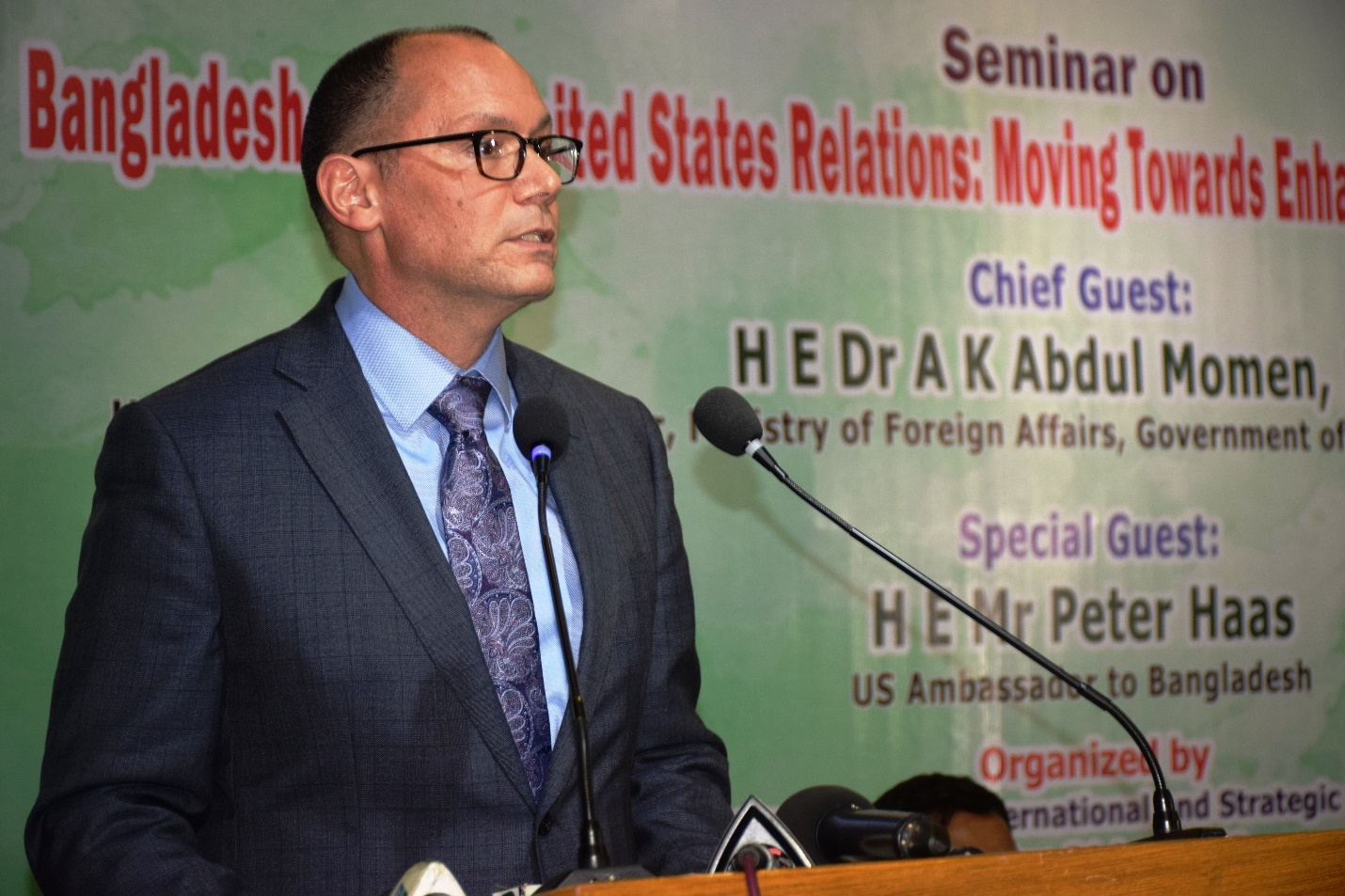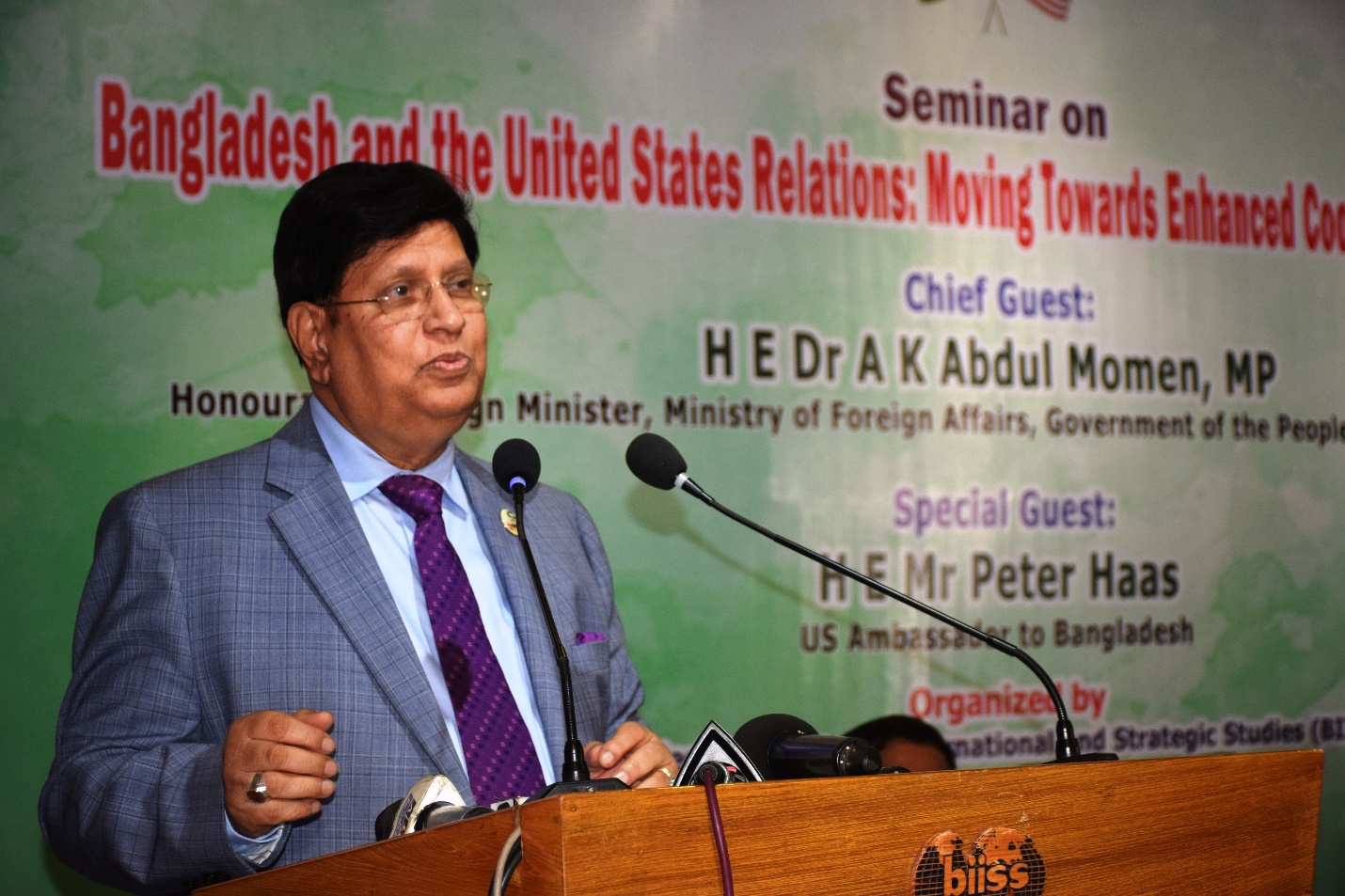Seminar on “Bangladesh and the United States Relations: Moving Towards Enhanced Cooperation and Partnership” on 24 April 2022
DATE: 2022-04-24
Bangladesh Institute of International and Strategic Studies (BIISS) organized a Seminar on “Bangladesh and the United States Relations: Moving Towards Enhanced Cooperation and Partnership” on 24 April 2022. H.E. Dr. A K Abdul Momen, MP, honourable Foreign Minister, Government of Bangladesh graced the occasion as the chief guest. H.E. Mr. Peter Haas, US Ambassador to Bangladesh, was the special guest. Major General Mohammad Maksudur Rahman, OSP, BSP, psc, Director General, BIISS, delivered the welcome address. Ambassador Kazi Imtiaz Hossain, paa, Chairman, BIISS presided over the session and delivered the concluding remarks.
In his address of welcome, Major General Mohammad Maksudur Rahman, OSP, BSP, psc, Director General, BIISS described the importance of Bangladesh-US relations and gradual development of relationship which strengthened mutual cooperation and increased partnership in numerous sectors such as trade, energy cooperation, infrastructure development, ICT, human resource development, security cooperation, etc. He mentioned about US’ crucial role in providing humanitarian aid and attempts to ensure safe, dignified, and orderly repatriation of the forcibly displaced Rohingyas. He highlighted about the continuous US support through the COVAX platform to provide Bangladesh with Covid-19 vaccines.
Referring to security cooperation in Bangladesh-US relations, he highlighted that Bangladesh is committed to working with the US and other stakeholders to ensure regional security and strategic interest of maintaining peace, security, and stability in the Indo-Pacific region.
Ruksana Kibria, Professor, Department of International Relations, University of Dhaka, presented on “The Evolving Bangladesh-US Relations”. Professor Kibria, pointed out that Bangladesh and the US have developed bilateral relations based on common interest and shared mutual benefits. She emphasized on bilateral economic, business and trade cooperation framework and formalization of strategic partnership dialogue that has been the keystone of this relation. She also talked about the changing dynamics of global politics, strategic geopolitical realities which were likely to incentivize both countries’ necessity to work together in time ahead.
Brig. Gen. (Retd.) Dr. M. Sakhawat Hossain, Senior Fellow, South Asian Institute of Policy and Governance, North South University and former election commissioner of Bangladesh, made a presentation on “Bangladesh-US Partnership for Enhanced Security in South Asia”. Gen Sakhawat highlighted some key aspects of security cooperation between Bangladesh and the US that include military training, exercises, military armament, counterterrorism, civilian security cooperation, peacekeeping operations, military diplomacy, regional security and, disaster management. He also mentioned about cooperation in maritime security, border security, peacekeeping-peacebuilding, humanitarian assistance and disaster relief. He suggested for enhancing military diplomacy as the ground prepared by peacekeepers and asked if the US might consider cooperating with Bangladesh in regional security, disaster management, and expand cooperation to resolve the Rohingya issue.
Ambassador Humayun Kabir, President, Bangladesh Enterprise Institute (BEI), and former Bangladesh’s Ambassador to the US, deliberated on “Contemporary Dynamics of Bangladesh-US Relations and the Way Forward”. Ambassador Kabir identified four dynamics, e.g., economic, strategic, governance and humanitarian to define the bilateral relationship. He noted that the US policy has a substantial focus in Bangladesh with regard to agriculture, private sector development, supporting civil society, disaster management, growing people to people connectivity, remittance, and vaccine support during the COVID-19. As the world is becoming globalized and at the same time getting fragmented, diplomacy could be the only friend to ensure security, prosperity and future course of action as Bangladesh and USA should deepen their ties to move ahead.
Ambassador Tariq A. Karim, Director, Centre for Bay of Bengal Studies, Independent University of Bangladesh (IUB) and former Bangladesh’s Ambassador to the United States provided his insightful remarks as distinguished discussant. Ambassador Karim highlighted that Bangladesh has been a bright example for development for the world and is in crucial juncture which makes it a strategically important country for the US. The US can assist Bangladesh in coming 50 years for the potential it has shown in last half a century. He praised Bangladesh for championing regional harmony, integration and bringing peace and stability in the Indo-Pacific which the US hopes for the region.
In his remarks, special guest H.E. Mr. Peter Haas noted that Bangladesh and the US developed a strong, integrated and deep bilateral relations in last 50 years. They can enhance their cooperation in security, human rights and democracy, and economic relations. In this regard, he highlighted US-Bangladesh defence cooperation, talked about GSOMIA and ACSA agreements’ prospect to enhance it further; the US hopes to see a proper democratic process where people will decide their government. He acknowledged the contribution of law enforcement agencies to maintain security whereas hopes to see them uphold human rights in the process. The US wants to deepen bilateral economic relations with Bangladesh and they can work together to develop agriculture, banking, healthcare etc.
The chief guest, H.E. Dr. A K Abdul Momen, MP, honourable Foreign Minister, Government of Bangladesh in his remarks, highlighted the long bilateral relations of Bangladesh with the US. He expressed gratitude towards US citizens who supported the cause of Bangladesh’s liberation in 1971. He focused on historical ties with the US in light of our common struggle against tyranny, shared values of freedom and democracy. He mentioned that RAB has been performing as a cornerstone for implementing Bangladesh government’s “Zero Tolerance” approach towards combatting violent extremism, terrorism and transnational crimes to ensure national and regional security and the US has been instrumental in achieving this objective.
Ambassador Kazi Imtiaz Hossain in his concluding remarks noted that Bangladesh-US relations have evolved into dynamic relations over the last half a century. He reiterated Bangladesh’s commitment to work with the US to promote regional peace, belief in the ideals of democracy and combating terrorism. The US has been a committed partner for Bangladesh’s economic development being the largest market for exports and source of FDI. He highlighted about the presence of a strong diaspora community in the US and their contribution for mutual development. He also mentioned about the US support in providing the humanitarian assistance to manage Rohingya crisis and the necessity of US support to counter climate changes impacts, etc.
Senior officials from different ministries of government, ambassadors and high commissioners, former diplomats, senior military officials, media, academia, researchers, teachers and students from different universities participated in the Seminar.

